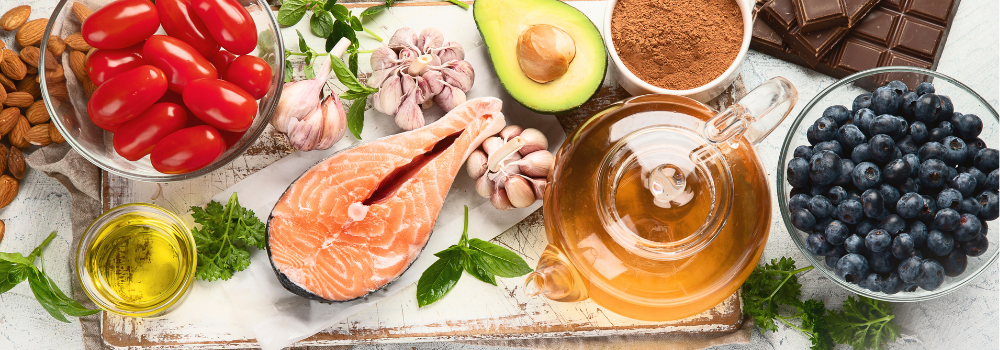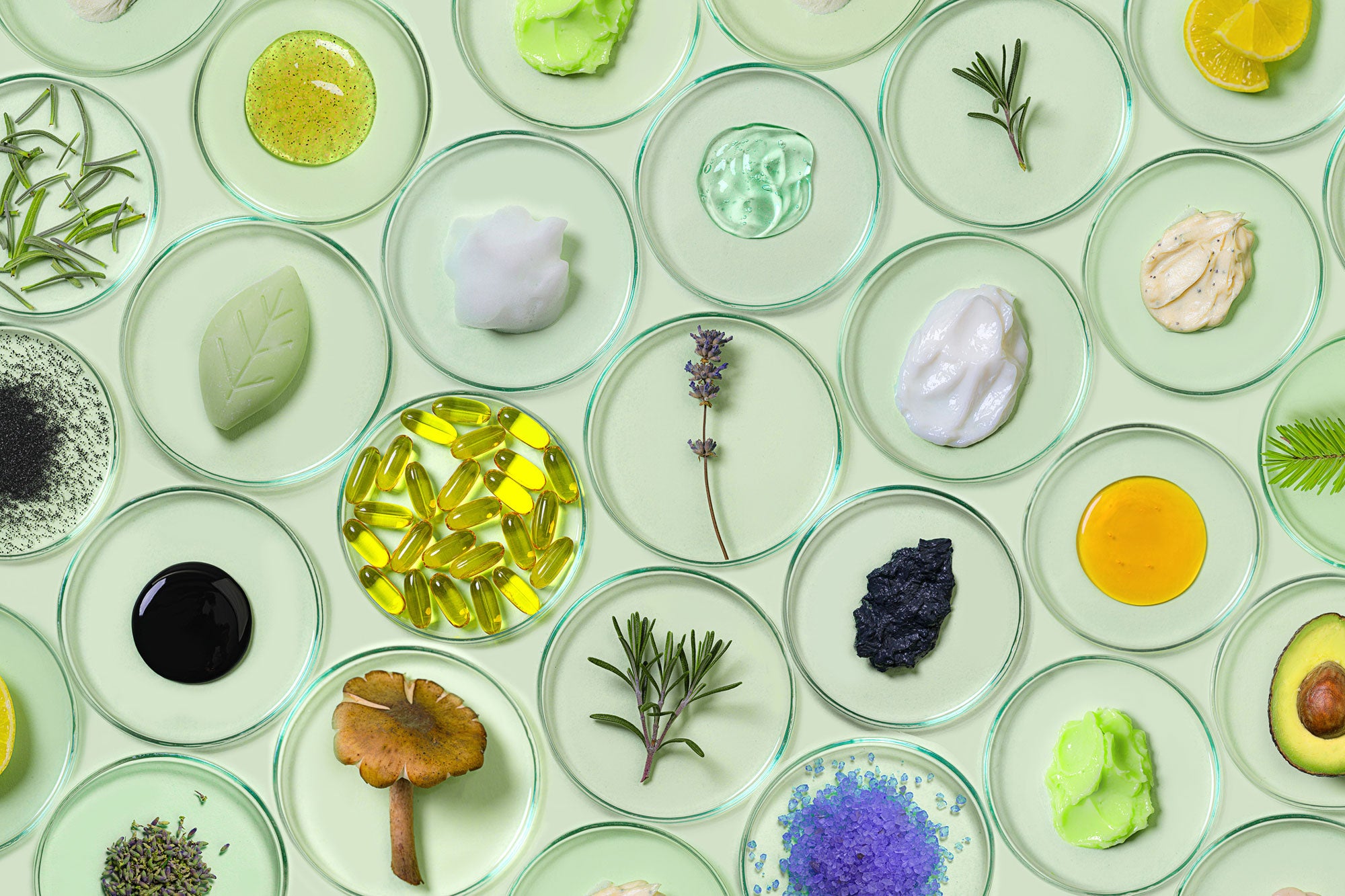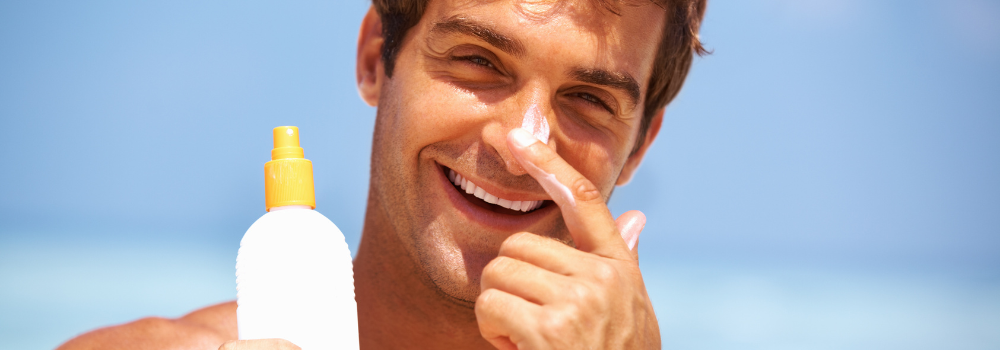
The Role of Diet in Skin Health: What to Eat for a Glowing Complexion
In the pursuit of radiant and youthful skin, many people often look to topical treatments like serums and creams. While these can certainly play a role, the journey to truly healthy skin starts from within. The nutrients we consume play a vital role in maintaining skin health, and certain foods can significantly enhance the complexion. Ideally you should try to get these vitamins and minerals from whole foods, but understandably this can be quite hard to do all the time, which is why supplements can be useful.
Disclaimer: Always consult your healthcare provider before making any changes to your diet or adding supplements to ensure they are safe and suitable for your individual health needs.
Here’s a closer look at the importance of diet in skin health and what you should include in your diet for a glowing complexion.
1. Antioxidant-Rich Foods: Antioxidants help to combat free radicals that cause oxidative stress and premature aging. Incorporating these foods into your diet helps to reduce inflammation and protect your skin from damage. Foods rich in antioxidants include:
- berries (blueberries, strawberries, raspberries)
- dark chocolate
- nuts, and seeds
2. Omega-3 Fatty Acids: Omega-3s are essential fatty acids that our body cannot produce on its own. They help maintain the skin's lipid barrier, which keeps the skin hydrated and supple. Sources of omega-3s include:
- fatty fish (like salmon and mackerel)
- flaxseeds
- chia seeds
- walnuts

3. Vitamin C: Vitamin C is crucial for collagen synthesis, a protein that maintains skin structure. This vitamin also aids in the healing process and helps reduce the appearance of fine lines and wrinkles. Good things to eat are:
- citrus fruits
- strawberries
- bell peppers
- broccoli
4. Vitamin E: Another powerful antioxidant, vitamin E, helps protect the skin from sun damage and inflammation. It is found in nuts, seeds, and leafy green vegetables.
5. Beta-Carotene: Beta-carotene, found in carrots, sweet potatoes, and pumpkins, is a precursor to vitamin A. This vitamin helps repair damaged skin and supports the regeneration of new skin cells.

6. Zinc: Zinc plays a crucial role in wound healing and combating acne due to its anti-inflammatory properties. Foods rich in zinc include oysters, beef, pumpkin seeds, and chickpeas.
7. Probiotics: Gut health and skin health are closely linked. Probiotics are live beneficial bacteria that help maintain the natural balance of organisms (microflora) in the intestines. A healthy gut microbiome, with a diverse range of good bacteria, is crucial for proper digestion, nutrient absorption, and immune function.

Sources of probiotics include:
-
Yogurt and Kefir: Rich in live cultures, these fermented dairy products are among the best sources of probiotics.
-
Fermented Vegetables: Kimchi, sauerkraut, and pickles are great sources of beneficial bacteria.
-
Kombucha: A fermented tea rich in probiotics that can help boost gut health.
-
Supplements: Probiotic supplements can be an effective way to introduce specific strains that support skin health.
The Gut-Skin Axis: The gut-skin axis refers to the bidirectional relationship between the gut microbiome and the skin. An imbalance in gut bacteria (dysbiosis) can lead to inflammation and immune system dysfunction, which may manifest as skin issues like acne, eczema, psoriasis, and rosacea.
8. Collagen: Collagen is the most abundant protein in the body and a major component of skin structure. It provides the skin with strength and elasticity, preventing wrinkles and sagging. As we age, the body's collagen production declines, leading to signs of aging. Consuming collagen-rich foods like bone broth, fish, and chicken skin, or supplementing with hydrolyzed collagen, can help replenish collagen levels. Moreover, collagen supplements are often combined with vitamin C to enhance absorption, promoting smoother and firmer skin.
While there's promising evidence suggesting potential benefits of collagen supplementation for skin health, more independent, large-scale studies are needed to establish its efficacy definitively. Those interested in collagen supplements are encouraged to use high-quality products and consider a diet rich in protein and other nutrients that support the body's natural collagen production.

East Asian Natural Remedies
East Asian remedies for skin health have been used for centuries, deeply rooted in traditional practices and holistic philosophies. These natural ingredients often emphasize balance, using botanicals and minerals to support overall wellness and enhance beauty. From snow fungus and pearl powder to goji berries and green tea, these remedies combine natural antioxidants, vitamins, and anti-inflammatory compounds. They aim to nourish the skin from the inside out, offering a holistic approach to skincare that aligns with the principles of Traditional Chinese Medicine (TCM) and other regional healing systems.

-
Snow Fungus (Tremella fuciformis): This unique mushroom is revered in traditional Chinese medicine for its hydrating properties. It's said to retain moisture, similar to hyaluronic acid, and has been used for centuries to promote a youthful appearance. Consuming snow fungus in soups or desserts can enhance skin hydration and elasticity, supporting a plump and radiant complexion.
-
Goji Berries (Lycium barbarum): Often called the "superfood of Asia," goji berries are packed with antioxidants, particularly vitamin C and beta-carotene, which combat oxidative stress and promote collagen production. They are also rich in amino acids that help maintain skin moisture. Adding dried goji berries to your diet, whether in teas, smoothies, or snacks, can help protect your skin from free radicals and maintain its vitality.
-
Pearl Powder: Used for centuries in Chinese medicine, pearl powder is believed to have anti-inflammatory and antioxidant properties. It can be taken orally or applied topically to promote even skin tone and reduce redness. Pearl powder contains amino acids and minerals that can support skin repair and renewal.
-
Green Tea: An integral part of East Asian culture, green tea's polyphenols and antioxidants are well-known for their anti-inflammatory and anti-aging benefits. Drinking green tea regularly or using it topically in skincare products can protect the skin from environmental damage, maintain elasticity, and reduce the appearance of wrinkles.
Achieving a glowing complexion is not just about what you put on your skin but also what you put in your body. A balanced diet rich in antioxidants, healthy fats, vitamins, and minerals is essential for skin health. By being mindful of your dietary choices and incorporating these skin-loving foods, you can nourish your skin from the inside out and maintain a youthful, radiant glow.



Leave a comment
This site is protected by hCaptcha and the hCaptcha Privacy Policy and Terms of Service apply.